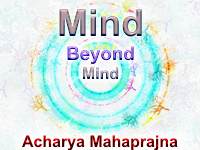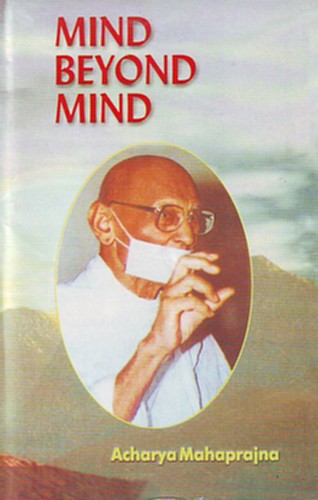
Those who need water go to the bank of a river, fill their pots and return. The adventurous, however, are not satisfied with the fulfilment of the immediate needs of life. They would like to jump and dive into the river in order to fathom its depths.
Man's thinking is governed by a very small part of his consciousness. The commerce of human life does not need more than a small amount of consciousness.
Sometimes we become spectators of our own consciousness and of what is happening therein. Very often we are not very serious spectators of our own consciousness. There are, of course, a few who would dare dive into the depths of consciousness like divers in search of precious stones. Diving into consciousness is the privilege of those who possess moral courage, patience and initiative. The depths of consciousness are unfathomable. Consciousness is as infinite as the universe we live in. Imagination fails to comprehend it. Usually we do not imagine that there is a whole universe of consciousness behind and below the small part of it, which governs our worldly life. Our minds are accustomed to act and think within certain limits only. They cannot have any idea of the limitless expanse and depth of consciousness.
The raw material of intellectual knowledge is supplied by the sense organs. The sense organs have their own limitations. They can establish contacts with gross things only. The mind works on the information supplied by the sense organs and the intellect organizes and arranges it. The knowledge, which the mind and the intellect construct, is not pure knowledge. It is often alloyed with attachments and aversions, with the feelings of pleasure and pain and with hundred and one other things. How much value should we put on such knowledge? What we ordinarily call knowledge is adulterated knowledge. It is not as valuable as we think it to be. We value it because we have not been able to go beyond its limitations. We value intellectual knowledge because we do not know that there is a state of the mind in which thinking does not exist. We will have a strange and revolutionary experience if we could go beyond the gravitational field of worldly existence to where time moves very slowly, where the push and pull of life are absent and where time and motion do not become a burden.
It is only when we arrive at moments of complete absence of thinking that we will be able to understand what we really are. Thinking has a gravitational force and it is only when this force has been eliminated that we can realize the value of thoughtlessness.
How to come out of the gravitational field of thinking is a big question. The human self remains swarmed around by sounds, forms and bodies. They keep bombarding us continuously, and in such a situation we remain conscious of one thing only and that is our body. As a matter of fact, the body itself is a form, which keeps the self entrapped. We cannot see anything beyond the body.
The body has Prana, (vital force). Prana is connected with Manasa (mind). Manasa is connected with Buddhi (intellect). All these taken together constitute a vicious circle, which has neither a beginning nor an end. The self finds it difficult to break this vicious circle. We will not be able to appreciate the idea of pure consciousness until we are able to appreciate the idea of a thoughtless state of the mind. The self can be known and realized only in those moments in which thinking has completely ceased. Thinking cannot lead to self-knowledge.
Philosophers have done a lot of thinking on the subject of the self. There are those who have tried to prove its existence and those who have denied it. All this assertion and denial is itself thinking. How can the self, which is beyond thinking be known and realized or denied and disproved by thinking. The self is not an object in the world of thought. That is why all our attempts at discussing the nature of the self have failed. Only those who have raised themselves above the level of thoughts can speak with certainty about the nature of the self.
We are confronted with a world process characterized by forms and forms only. We cannot see the formless. The problem is how to see the formless self and to understand the nature of pure consciousness. The relation between form and essence is the central question of epistemology. Man has devised the process of separating essences from their forms. We produce butter from milk and scents from flowers. We have invented the mechanisms of churning and distillation. But how can the soul be separated from the body? How can we separate the infinite from the finite? The masters of Yoga devised the method of doing this.
We can know the soul with the help of its reflection. What we see in a mirror, when we stand before it, is neither our body nor the mirror, but only the reflection of the body in the mirror. It is on the basis of this reflection that we say that our body resembles it. We come to recognize the body whenever it comes before the mirror. In the same way we can recognize the soul from its reflection. There is a Yogic practice known as the sadhana of Chaya Purusa. The practitioner stands with his face towards the sun. He then looks at his shadow. Then he closes his eyes and again looks at the sun. He repeats this several times. Ultimately he can see his own figure in the sky. He can also see the reflection of the sky on his shadow.
We can see the soul also, but this is possible only in moments of thoughtlessness, when we neither hear sounds nor see objects. The Preksha meditation is a process, through which we can get rid of thoughts, sounds and forms and, enter into the state of the cessation of thinking. We can get a glimpse of the soul in such a moment only. One of the cautions in Preksha Dhyana calls upon the practitioner to see and know clearly. Tendencies and inclinations of the mind and attachments and aversions have got to be neutralized before we can see an object as it is. The act of seeing and knowing things as they are is a reflection of the soul. We can catch the soul through such reflections only, for it is the nature of the soul to see and know. He alone who does nothing else except seeing and knowing can have a glimpse of the soul. Perception and knowledge are means of self-knowledge, provided they are not affected by anything external. Contacts with external things push the practitioner back to the world of thinking or the mind.
 Acharya Mahaprajna
Acharya Mahaprajna

